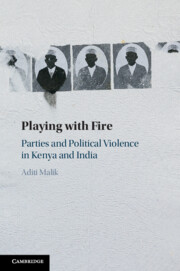
- Coming soon
- Publisher:
- Cambridge University Press
- Expected online publication date:
- July 2024
- Print publication year:
- 2024
- Online ISBN:
- 9781009444217


Drawing on a rare cross-regional comparison of Kenya and India, Playing with Fire develops a novel explanation about ethnic party violence. Combining rich historical, qualitative, and quantitative data, the book demonstrates how levels of party instability can crucially inform the decisions of political elites to organize or support violence. Centrally, it shows that settings marked by unstable parties are more vulnerable to experiencing recurring and major episodes of party violence than those populated by durable parties. This is because transient parties enable politicians to disregard voters' future negative reactions to conflict. By contrast, stable party organizations compel politicians to take such costs into account, thereby dampening the potential for recurring and severe party violence. By centering political parties as key actors in the production of conflict, and bringing together evidence from both Africa and South Asia, Playing with Fire contributes new insights to the study of political violence.
'Drawing on extensive primary research and a rare cross-regional comparison, Malik shows how the oft-ignored question of party stability can condition elite decisions about supplying party violence. This thought-provoking book is a must read for anyone interested in political parties and political violence in countries with weak accountability institutions.'
Gabrielle Lynch - Professor of Comparative Politics, University of Warwick
'Malik’s comparison of ethnic violence within and across Kenya and India is both novel and timely. Her argument that levels of party instability shape elite decisions about the costs and benefits of fostering violence will likely provoke lively debate. Playing with Fire provides a useful addition to a much-debated issue in comparative politics.'
Amrita Basu - Paino Professor of Political Science and Sexuality, Women's and Gender Studies, Amherst College
'This ambitious book is one of the first attempts to place Kenyan electoral violence in cross-regional perspective. The comparison to India is a productive one, generating new insights with important implications not only for our understanding of the organization of political violence, but also for the growing literature on the nature and impact of party organization in Africa and Asia.'
Nic Cheeseman - Director of the Centre for Elections, Democracy, Accountability and Representation, University of Birmingham
'This is a deeply researched and compelling study of when political parties are most likely to deploy violence. Aditi Malik argues that party stability is a crucial variable to explain this hugely important phenomenon. The theory is supported by careful and persuasive multi-method evidence from India and Kenya. This book deserves close attention and sustained engagement from anyone interested in the complex relationship between violence and democracy.'
Paul Staniland - Professor of Political Science, The University of Chicago
 Loading metrics...
Loading metrics...
* Views captured on Cambridge Core between #date#. This data will be updated every 24 hours.
Usage data cannot currently be displayed.